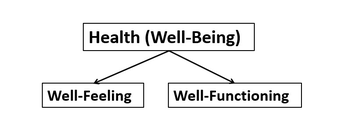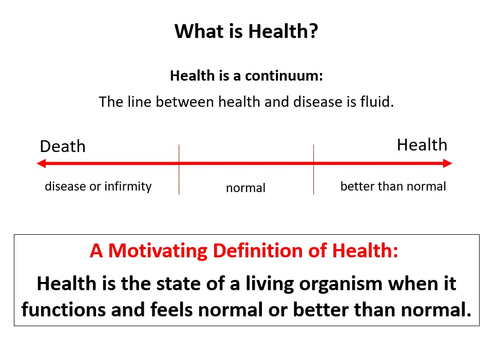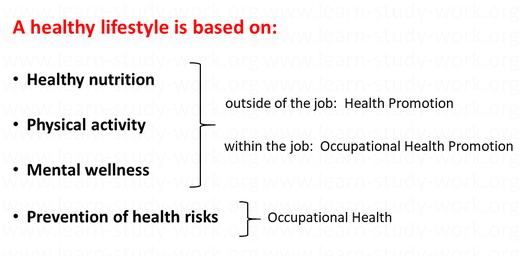What is Health? - a motivating definition
Key message: Health is the state of a living organism when it functions and feels normal or better than normal.
"The preamble to WHO’s constitution provides a definition of health:
'Health is a state of complete physical, mental and social well-being and not merely the absence of disease or infirmity.' " (www.who.int/about/frequently-asked-questions, 30.12.22)
What is the meaning of well-being?
Well-being is a multidimensional concept:
"Current well-being is measured in terms of outcomes achieved in the two broad domains: material living conditions (income and wealth, jobs and earnings, housing conditions) and quality of life
(health status, work-life balance, education and skills, social connections, civic engagement and
governance, environmental quality, personal security and subjective well-being)." (OECD (2013), How’s Life? 2013: Measuring Well-being, OECD Publishing. https://read.oecd-ilibrary.org/economics/how-s-life-2013_9789264201392-en#page23, p. 21)
"The Oxford English dictionary defines well-being as 'the state of being comfortable, healthy, or happy'. Despite the lack of a more precise definition, the term is often used in the academic literature, frequently in a way that echoes the WHO definition of health ... It has the sense of reflecting something about a person’s overall state of being, beyond more narrow or specific measures." (World Health Organization. (2012). Measurement of and target-setting for well-being. https://www.euro.who.int/__data/assets/pdf_file/0009/181449/e96732.pdf, 31.12.22, p. 4)
In terms of health, well-being is more than "the absence of disease or infirmity". It is necessary to find words that characterize the additional parts.
"The concept of wellbeing comprises two main elements: feeling good and functioning well. Feelings of happiness, contentment, enjoyment, curiosity, engagement and fulfillment are characteristic of someone who has a positive experience of their life. Equally important for wellbeing is our functioning in the world and the opportunities we have to be ourselves and become the people we want to become. Experiencing positive relationships, having some control over one’s life and having a sense of purpose are all important attributes of wellbeing (Huppert 2008)." (Jackson, N. J. (1975). CHAPTER A4. www.academia.edu/3675230/Exploring_Subjective_Wellbeing_and_Relationships_to_Lifewide_Education_Learning_and_Personal_Development_Norman_J_Jackson, 06.01.23, 1st sentence)
Physical well-being is the absence of physical disease or infirmity and physically feeling good and functioning well (= physical functioning according to our possibilities and like the people we want to be).
"Physical well-being consists of the ability to perform physical activities and carry out social roles that are not hindered by physical limitations and experiences of bodily pain, and biological health indicators." (https://link.springer.com/referenceworkentry/10.1007/978-94-007-0753-5_2166, 31.12.22)
Mental well-being is the absence of mental disease or infirmity and mentally feeling good and functioning well (= mental functioning according to our possibilities and like the people we want to be).
"Sustainable well-being does not require individuals to feel good all the time; the experience of painful emotions (e.g. disappointment, failure, grief) is a normal part of life, and being able
to manage these negative or painful emotions is essential for long-term well-being. Psychological well-being is, however, compromised when negative emotions are extreme or very long lasting and
interfere with a person’s ability to function in his or her daily life. (Huppert, F. A. (2009). Psychological well‐being: Evidence regarding its causes and consequences. Applied psychology:
health and well‐being, p. 1)
The WHO definition lists social well-being as an important aspect of health.
"Social wellbeing is building and maintaining healthy relationships and having meaningful interactions with those around you." (www.bu.edu/studentwellbeing/what-is-wellbeing/social-wellbeing/, 31.12.2022)
"The communities we inhabit affect our social wellbeing. People who have partners, close friends and confidants, friendly neighbours and supportive co-workers are less likely to experience sadness, loneliness, low self-esteem and problems with eating and sleeping." (Jackson, N. J. (1975). CHAPTER A4, p. 14, see above)
But social well-being is only one element of the well-being concept (see the OECD-Citation above and Maslow’s Hierarchy of Needs). In my opinion, all elements are important for a human being to feel good. Example: Economic well-being ist important because no one is in a state of well-being who suffers from hunger (unless the person wants to lose weight).
The emotional quality of feeling good is called subjective well-being.
"As a psychological term, subjective well-being usually refers to a subject's own feelings and evaluations. ... Feelings and evaluations depend on a person's previous experiences, expectations, goals, and values, that is, his/her reasons for positive or negative emotions and evaluatlons may differ." (Hascher, T. (2010). Wellbeing. www.researchgate.net/publication/278023282_Wellbeing, 01.01.23, p. 99)
Whether a person feels well depends on his personal judgment. Therefore, it is better to refer well-being to the normal state of an organism: Any person who functions normally and feels normal, he is in a state of normal well-being. What is normal depends on the age of the organism.
Examples:
If a bird cannot fly, then it is sick. If a human being can't fly, that is normal.
After a blood test, the doctor says, "All your blood values are in the normal range."

The definition of health
As a conclusion, we come to this definition of health:
Definition: Health is the state of a living organism when it functions and feels normal or better than normal.
This definition is easy to understand and motivates us to try to get into a state that is better than normal.
"The involvement of functioning in the definition of health would be reflected in defining the promotion of health as a process by which the capacity of individuals to cope [with all demands of daily life] will be enhanced and strengthened, for example by regular and obligatory physical exercise." (Sartorius, N. (2006). The meanings of health and its promotion. Croatian medical journal, 47(4), p. 663. www.ncbi.nlm.nih.gov/pmc/articles/PMC2080455/, 02.01.23)

"... we need to realize that even the simplest living system, a bacterial cell, is a highly complex network involving literally thousands of interdependent chemical reactions." (Capra, F. (2007). Complexity and life ([dagger]). Systems Research and Behavioral Science, 24(5), p. 475)
Living organism are highly complex. It is understandable that not all processes occur as they do in other organisms of the same species. Therefore, each organism has its own health.
What is well-functioning?
"Body functions are the physiological or psychological functions of body systems. ... No part of the body, from the smallest cell to a complete body system*, works in isolation. All function together, in fine-tuned balance, for the well being of the individual and to maintain life.
*The different systems within the body are: 1. Cardiovascular system 2. Digestive system 3. Endocrine system 4. Integumentary system 5. Lymphatic system 6. Muscular system 7. Nervous system 8. Reproductive system 9. Respiratory system 10. Skeletal system 11. Urinary system " (https://training.seer.cancer.gov/anatomy/body/functions.html , 08.10.21)
What is well-feeling?
"For Aristotle, living a good life meant achieving one’s potential in knowledge, health, friendship, wealth, and other life domains ... Two conceptual approaches to wellbeing research now dominate the field ... The objective approach defines wellbeing in terms of quality of life indicators such as material resources (e.g. income, food, housing) and social attributes (education, health, political voice, social networks and connections). The subjective approach emphasises subjective wellbeing, that is people’s own evaluations of their lives, especially their life satisfaction (a cognitive evaluation), happiness (a positive emotional state) and unhappiness (a negative emotional state)." (Western, M., & Tomaszewski, W. (2016). Subjective wellbeing, objective wellbeing and inequality in Australia. PloS one, 11(10), e0163345. www.ncbi.nlm.nih.gov/pmc/articles/PMC5047468/pdf/pone.0163345.pdf, 20.06.20, p. 1-2)
Objective well-being is more or less the precondition for subjective well-being (well-feeling).
"Measures of subjective well being ask individuals to self report ratings of aspects of their lives, including satisfaction with their live as a whole, their feelings at a particular moment, or
the extent to which their life have meaning or purpose. These measures focus on what people believe and report feeling, not their objective conditions, although they can be related to objective
conditions." (For Good Measure Advancing Research on Well-being Metrics Beyond GDP, https://read.oecd-ilibrary.org/economics/for-good-measure_9789264307278-en#page166, 20.06.20, p.
164)
How do human beings function and feel better?
Human beings function and feel better when they follow a healthy lifestyle.

Read on Learn-Study-Work: "What is Occupational Health?", "What is Health Research", "Critical Appraisal", "How to define words", "How to write a text", "What is Science", "What is Respect", "How to respond to disrespect", "How to solve problems"
